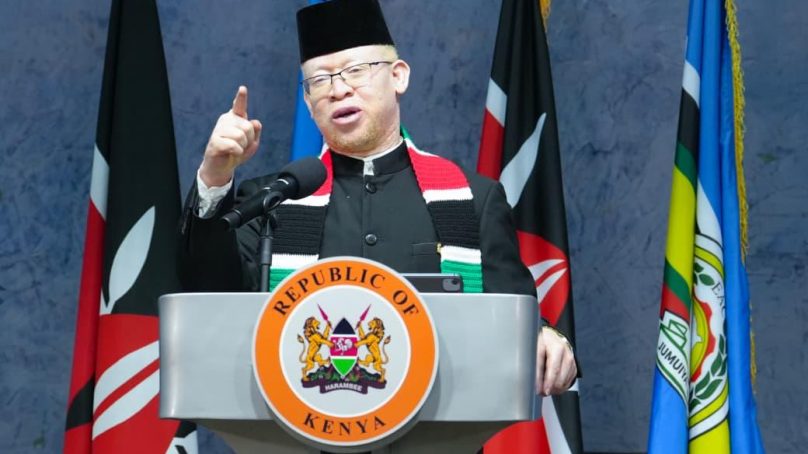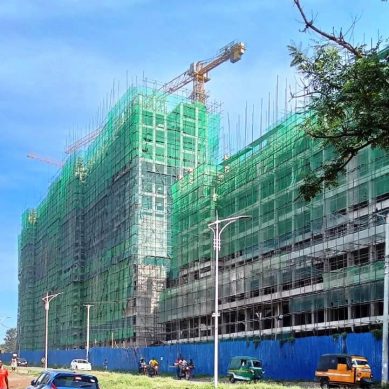
Kenya Kwanza marks the third year in power since the swearing-in of President William Ruto by highlighting achievements in its Medium-Term Plan 4 of the Kenya Vision 2030 under the five critical pillars of agriculture, healthcare, housing, small businesses and the digital and creative economy.
But what should have been a report card by the governed, the regime became hymnal choruses by state functionaries that obscure the economic and social realities in major part of the country.
According to the Government Spokesperson Isaac Mwaura, the government has made considerable progress in transforming the lives of ordinary Kenyans through the Bottom-Up Economic Transformation Agenda, abbreviated as BETA Plan.
Speaking in Nairobi during a media briefing, Dr Mwaura noted that in the agriculture sector, there has been a significant subsidy that reduced the cost of fertiliser from Ksh7,000 per bag to Ksh2,500, a reduction of Ksh5,000, which translates to billions of shillings saved for Kenyans.
He said support has been extended to farmers of edible oils, rice, nuts, cotton and pyrethrum, thereby reducing household spending.
“To date, seven million farmers have been registered in the digital database and 21 million bags of fertiliser distributed countrywide,” Mwaura said, adding that as a result farmers’ earnings have increased significantly: coffee by 52 per cent, tea by 40 per cent and sugar by 76 per cent.
Further, he cited critical gains in transforming the lives of farmers following a rise in average price of coffee per kilogramme to Ksh120 – some cooperatives paying as high as Ksh150 – while tea is trading at about Ksh64 per kilogramme and sugar prices jumped from Ksh4,000 to Ksh5,500 per metric tonne.
“In Nakuru, for instance, we witnessed how pyrethrum farming is reviving livelihoods. We met Mr and Mrs Gitao of Njoro, whose lives have been transformed by the revitalisation of the pyrethrum processing factory,” he narrated, assuring that these are the deliberate efforts geared towards achieving guaranteed minimum returns for farmers, as promised.
On jobs, businesses, industrialisation, loans and opportunities, the government spokesperson revealed that 2.25 million small businesses have been formalised, while 31 constituency industrial development centres have been upgraded.
These efforts, Mwaura was adamant, created over 9,000 jobs, giving young people greater access to employment. Additionally, he pointed out that cold storage facilities, incubation hubs and county trade fairs have also opened up new markets for young entrepreneurs.
“We also have functional digital hubs across the country, well stocked with computers and the internet. Just this past weekend in Embu, we saw the impact first-hand. Young people are earning significant incomes – one of them even shared how he made Ksh3 million in a short time,” he reported, stressing that these hubs are proof that industrialisation, combined with the digital superhighway, is creating opportunities.
Likewise, Mwaura disclosed that over 13 counties are at advanced stages in setting up agricultural industrial parks, citing the one in Sagana in Kirinyaga County, which is already performing well in addition to others such as Homa Bay.
By combining county industrial development centres with digital marketing platforms, the spokesperson said Kenya is expanding its manufacturing footprint where more young people are working remotely as virtual assistants for international companies, thanks to internet connectivity.
Mwaura announced that 161,911 affordable housing units are under construction, a tremendous increase from the 8,872 units in 2022. This progress, he said, has created more than 330,000 jobs in the construction and dual academy sectors. Some Ksh4.4 billion has been invested in training artisans with over 1,000 certified to supply building materials, he added.
“A total of 3,855 new mortgages have been issued at lower interest rates, making home ownership more accessible,” he said.
Further, Mwaura said the programme is also supporting thousands of suppliers – cement, steel – sand, artisans (fundis) and transporters, describing the country as a construction site with affordable housing projects being visible from Thika Road near TRM to Ruiru, Kapsabet, Laikipia and even Northern Kenya.
He reaffirmed that these houses are for all Kenyans, teachers, police officers, civil servants, salaried and unsalaried workers boasting that individuals to own an apartment for Ksh1-2 million is unheard of globally.
“Despite challenges at the start, we are on course to delivering the promised 200,000 units per year. Already, 161,000 are under construction, with over 700,000 more in planning,” he reassured.
Mwaura said that the housing programme has also created opportunities for women and youth as young women’s participation has been increased from 20 per cent to 30 per cent, while 4,000 engineering internship placements are giving graduates their first experience in government
Notably, the spokesperson noted that in healthcare, under the new Social Health Authority – Taifa Care – 25.8 million Kenyans have been registered, a sharp rise from 8 million in 2022, which demonstrates expanded access and availability of services.
He disclosed that the government is also registering indigent households, ensuring nobody is left behind. Mwaura divulged that the ministry of health has recruited and trained 107,000 community health promoters, established cancer treatment centres, and screened millions for chronic diseases.
Since 2022, he declared that over 350 hospitals have been built or upgraded, in partnership with counties, and 10,582 facilities have been digitised.
“Over Ksh68 billion has been disbursed under Taifa Care, with Ksh13 billion allocated to primary health care and Ksh10 billion to emergency and critical care,” he proclaimed, emphasising that for the first time in history, every Kenyan now has a chance at healthcare coverage.
In the digital superhighway and creative economy, Mwaura observed that cheaper internet, enhanced government service access and new jobs are driving transformation, citing locally assembled smartphones that have cut device costs, while 834 studio recordings have supported creative talent.
Concurrently, he echoed that nearly 300,000 digital jobs have been created through ICT training and over 40,000 kilometres of fibre cable have been laid, enabling 1,578 public Wi-Fi hotspots and 404 digital hubs.
“More than 21,000 government services have been digitised, raising government collections to between Ksh700 million and Ksh1 billion daily up from just Ksh60 million,” remarked Mwaura, voicing that these funds are now available for better services to Kenyans.
The spokesperson affirmed that education has also advanced, with TVET enrolment rising from 340,713 in 2022 to over 718,000 today.
In the mining sector, he revealed that three laboratories have been established and artisanal cooperatives registered reporting that for the first time, a gold refinery is nearing completion at Ikolomani in Kakamega, ensuring local communities benefit directly.
Meanwhile, for foreign and diaspora relations, Mwaura confirmed that more than 200 agreements have been signed, strengthening bilateral ties. He claimed that diaspora remittances reached Ksh660 billion, about $5 billion, with 85 per cent supporting rural households.
“This surpasses tea and coffee as Kenya’s highest income earner even as the President has directed that this be scaled to Ksh1 trillion,” Mwaura said. The agreements with Saudi Arabia, Germany, the UK and others to ensure fair terms for Kenyan workers abroad.
The spokesperson stated that tourism and wildlife are also booming highlighting that during the high season, tour operators are fully booked, generating Ksh462.21 billion in revenue. In addition, he announced that Kenya received 2.42 million international tourists and over five million domestic tourists.
“Just at KICC, thousands of schoolchildren are experiencing Nairobi’s heritage. The Electronic Travel Authorization (ETA) has made Kenya more accessible and the sector is projected to surpass five million international arrivals in the near future,” Mwaura observed.
He reiterated that the government remains steadfast in turning its promises into tangible results for a stronger, inclusive, and more prosperous country.
- A Tell Media / KNA report / By Michael Omondi







